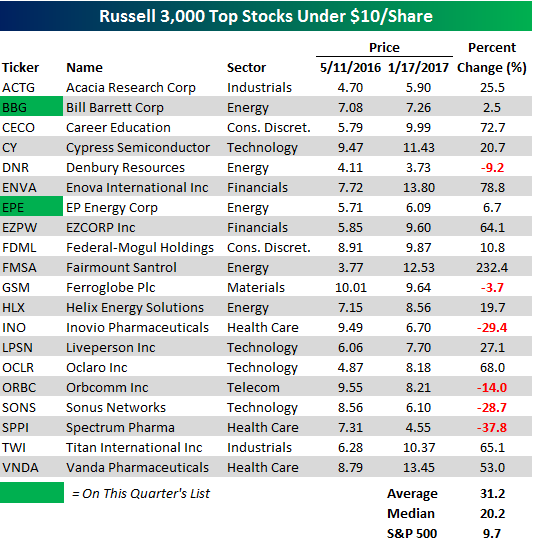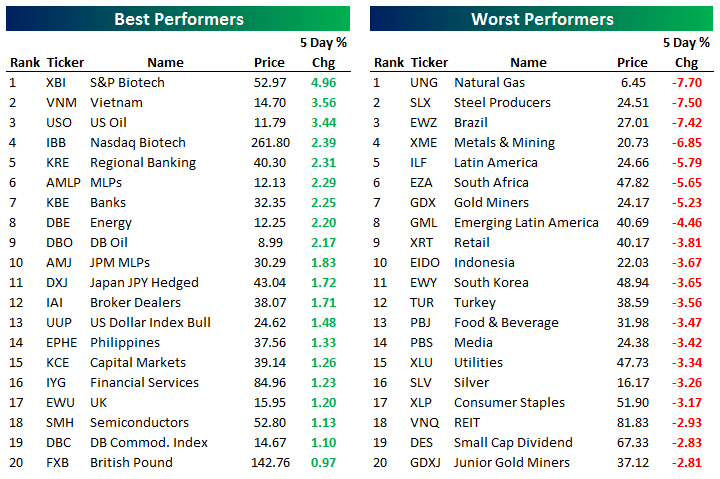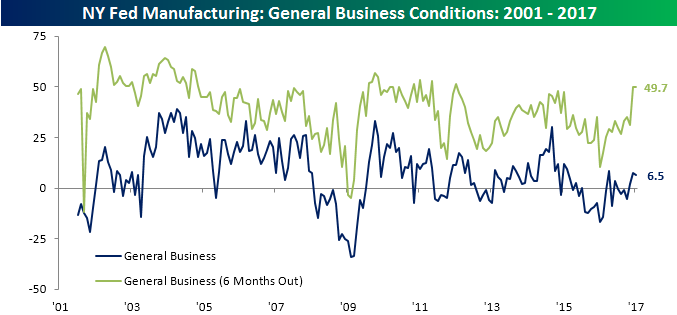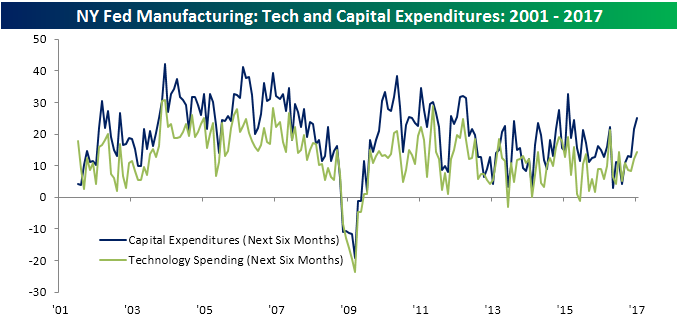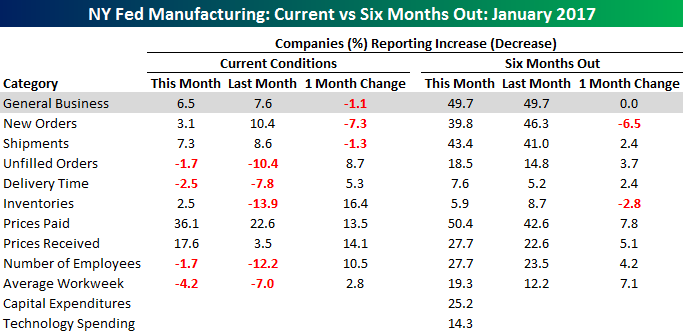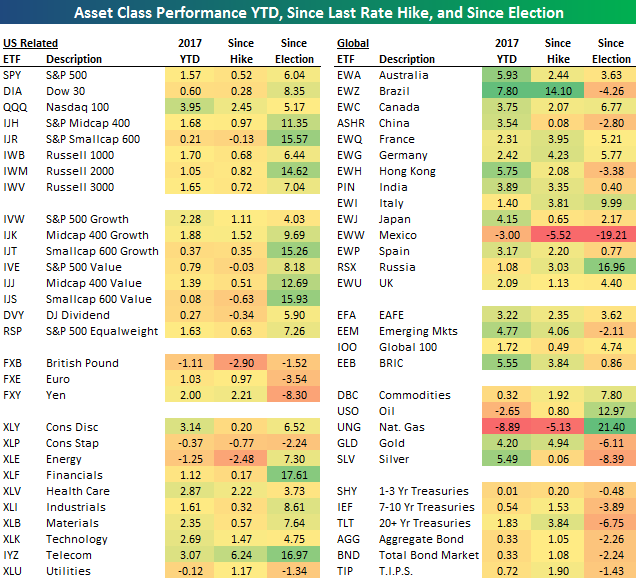Bespoke’s Top Stocks Under $10 Per Share
Earlier today, we sent Bespoke Premium and Bespoke Institutional clients our list of the top stocks trading under $10 per share. To compile the list, we start with all stocks under $10/share in the Russell 3,000 and then filter it based on a number of fundamental and technical criteria. To be included on the list, the stock must also have a market cap greater than $200 million and average daily volume of more than 200,000 shares/day.
The table below lists the 20 stocks that were included in our last update to this screen back in May 2016. Of those 20 names, two remained on the most recent list (BBG and EPE) and another five ‘graduated’ to double-digit levels. Looking at the performance of the individual stocks, six traded down and fourteen traded up since the list was published. The biggest losers on the list were Spectrum Pharma (SPPI), Inovio Pharma (INO), and Sonus Networks (SONS). On the upside, the biggest winner was Fairmount Santrol (FMSA), which rallied an astounding 232.4%. In addition to that gain, five other stocks saw gains of more than 50%. Overall, the average return of the 20 names listed was a gain of 31.2%, while the median gain was 20.2%. By either measure, the performance of the stocks listed was more than double the 9.7% return of the S&P 500.
To see this year’s list of the “Top Stocks Under $10,” sign up for a monthly Bespoke Premium membership.
The Closer 1/17/17 – USD, Equities, And Eurozone Lending
Log-in here if you’re a member with access to the Closer.
Looking for deeper insight on global markets and economics? In tonight’s Closer sent to Bespoke Institutional clients, we take a look at US equities and the dollar, as well as charting out the latest readings on credit availability and demand courtesy of the ECB’s Bank Lending Survey.
The Closer is one of our most popular reports, and you can see it and everything else Bespoke publishes by starting a no-obligation 14-day free trial to our research!
ETF Trends: Hedge – 1/17/17
Natural gas, steel, and gold miners have been the best performers of the past week with highly volatile Turkey also delivering a strong performance. South Korea was the best-performing country ETF over the last five sessions while LatAm and industrial metals have been strong too. Biotech, banks, pharma, and financials have underperformed in the past week as the markets continue to evaluate the policy platform of the incoming President.
Bespoke provides Bespoke Premium and Bespoke Institutional members with a daily ETF Trends report that highlights proprietary trend and timing scores for more than 200 widely followed ETFs across all asset classes. If you’re an ETF investor, this daily report is perfect. Sign up below to access today’s ETF Trends report.
See Bespoke’s full daily ETF Trends report by starting a no-obligation free trial to our premium research. Click here to sign up with just your name and email address.
Chart of the Day: Markets Post-Inauguration
Stock Seasonality Report: 1/17/16
Bespoke Stock Scores: 1/17/17
Empire Manufacturing Index Backs Off Recent Highs
After a big jump post-election, the Empire Manufacturing report for January backed off of its recent highs, missing consensus forecasts in the process. While economists were forecasting the headline reading to come in at a level of 8.5, the actual reading came in at 6.5. While the current conditions index backed off slightly, expectations for the future remained right at their multi-year high from last month.
Plans for capital expenditures and tech spending continued to rise this month, though. Plans for Cap Ex spending rose to the highest level since February 2015, while plans to spend on technology also increased.
Finally, the table below breaks down this month’s report by each of the report’s sub-indices. As far as current conditions are concerned, New Orders and Shipments both declined, while every other category increased. One notable increase was Prices Paid, which is now at its highest level in three years, while Prices Received is at its highest level in nearly five years.
Recent Asset Class Performance — International Markets Bounce
Get Bespoke’s 2017 Outlook Report with a 30-day free trial to Bespoke’s premium research! Click here to learn more.
Below is a look at the recent performance of various asset classes using key ETFs that we track on a daily basis. For each ETF, we show its performance year-to-date, since the Fed hiked rates on December 14th, and since the close on Election Day 2016 (11/8/16).
Most US equity ETFs (left side of matrix) are up between 0-2% so far year-to-date, but the Nasdaq 100 (QQQ) has been a standout to the upside with a 2017 gain of 3.95%. The Dow 30 (DIA) has lagged with a gain of just 0.60%. Looking at sectors, Consumer Discretionary (XLY) and Telecom (IYZ) are up the most YTD, while Energy (XLE) and Consumer Staples (XLP) are down the most.
Since the Fed hiked rates in mid-December, the Energy sector is the only area of the US market that has felt any kind of pain (-2.48%), while Consumer Staples is down less than 1%. Since the election, the Financial (XLF) and Telecom (IYZ) sectors are the only ones up more than 10%.
Outside of the US, many countries have already posted nice gains in 2017. Brazil (EWZ) is up 7.8% YTD after posting a big gain in 2016 as well. Hong Kong (EWH) and Australia (EWA) are both up more than 5%, while Canada (EWC), China (ASHR), India (PIN), and Japan (EWJ) are all up more than 3%. Mexico (EWW) is the only country on our matrix that is down year-to-date, and that follows a very weak Q4 as well.
Looking at commodities, gold (GLD) and silver (SLV) have both gotten off to good starts to 2017, while oil (USO) and natural gas (UNG) are in the red. Treasury ETFs are up both YTD and since the Fed hiked rates, but they’re all still down since the election.
Bespokecast — Episode 5 — Meb Faber
 In our newest conversation on Bespokecast, we speak with investor, blogger, analyst, and commentator Meb Faber. Meb is the CIO of Cambria Investments, has written three books on investing as well as 10 white papers and countless blog posts. You can follow his work at MebFaber.com. Cambria’s ETFs cover a broad swathe of US and global equity markets as well as asset allocation and fixed income. For Meb and Cambria, evidence-based investing is at the core of their investment approach, and we spend much of the podcast discussing the specific investment strategies this leads to. We were thrilled to record this conversation and are very excited with how it turned out. We hope you feel the same!
In our newest conversation on Bespokecast, we speak with investor, blogger, analyst, and commentator Meb Faber. Meb is the CIO of Cambria Investments, has written three books on investing as well as 10 white papers and countless blog posts. You can follow his work at MebFaber.com. Cambria’s ETFs cover a broad swathe of US and global equity markets as well as asset allocation and fixed income. For Meb and Cambria, evidence-based investing is at the core of their investment approach, and we spend much of the podcast discussing the specific investment strategies this leads to. We were thrilled to record this conversation and are very excited with how it turned out. We hope you feel the same!
To access episode 5 immediately, please start a 14-day free trial to Bespoke’s research product. If you’ve already signed up for a Bespoke free trial in the past, you can gain access by choosing a membership option at our products page. Here’s a look at past guests if you’re interested.
Bespoke Brunch Reads: 1/15/17
Welcome to Bespoke Brunch Reads — a linkfest of the favorite things we read over the past week. The links are mostly market related, but there are some other interesting subjects covered as well. We hope you enjoy the food for thought as a supplement to the research we provide you during the week.
Economics
Assessing The State of The Economy In Real Time Using Headline Economic Indicators (Council of Economic Advisors)
How accurately can we tell what’s happening in the economy based on first-reported economic data? And if we’re going to use that kind of information, which indicators should we use? [Link; 11 page PDF]
Bond Market Intermediation and the Role of Repo by Yesol Huh and Sebastian Infante (Federal Reserve Finance and Economics Discussion Series)
An academic investigation of the role played by repo markets, which allow the facilitation of client demand for bonds as well as funding dealer balance sheets. Limiting the use of repo has different consequences depending on whether it’s idiosyncratic or across all dealers. [Link; 45 page PDF]
Status Reports
Oil Drillers Are Expanding Again After Losing Half-Million Jobs by David Wethe (Bloomberg)
After shedding workers and slashing capex, firms in the global oil industry are one again boosting spending and hiring workers…many of whom have been forced to move on to other industries. [Link]
The disinflation scare is officially over (for now) by Matt Klein (FTAV)
Changes in options prices mean that the distribution of inflation outcomes currently prices very little risk of deflation, a stark turnaround from the state of affairs in the first half of 2016. [Link; registration required]
Outlook for 2017: Paradigm Shift (KKR)
A creative, informative, and well-considered annual piece, Kohlberg Kravis Roberts’ macro team lays out their current interpretation of global economics and financial markets with some views towards the future as well. [Link; 48 page PDF]
Federal Reserve
Fun and Games at the Fed by Shayndi Raice (WSJ)
A review of moments that occasioned laughter as shown from the full transcripts of the 2011 policy making year, recently released. [Link; paywall]
Big Names, Big Losses
Icahn Hedge Fund Loses 20% of Its Value in 2016 by Andrew Bary (Barron’s)
Despite support for the Presidential candidate who ended up coming out on top, Carl Icahn’s financial market bets this year were major losers. [Link; paywall]
Billionaire George Soros Lost Nearly $1 Billion in Weeks After Trump Election by Gregory Zuckerman and Juliet Chung (WSJ)
Political bias entraps even the best investors sometimes and that appears to have led to a 10 figure loss for one of the most successful global macro speculators of all time. [Link; paywall]
Narrative Failure
Wall Street’s Most Famous Quants Fed Up With JPMorgan Soothsayer by Dani Burger (Bloomberg)
While some of his clients are enamored by successful market calls based on analysis of positioning for risk parity and trend-following funds, many are starting to contest the approach taken by JP Morgan’s Mark Kolanovic. [Link]
2016 in Review: Best of the Silver Bullet Awards Part One by Jeff Miller (Dash of Insight)
A list of 12 different mythbusters that were successfully able to combat market myths (including one effort by our own Paul Hickey). [Link]
Politics
We Are Not the World by Greg Ip (WSJ)
A thoughtful and restrained review of the rising global (and anti-globalist) populism, including costs, benefits, context, and outlook. [Link; paywall]
Will Mark Zuckerberg Be Our Next President? by Nick Bilton (Vanity Fair)
When your subhead’s first sentence reads “It’s a serious question”, you may be out on a limb, but this article does offer a lot of insight into the thought process of one of the most powerful CEOs in the world. [Link]
Politics
Washington D.C. braces for Trump supporters and protesters by Adam Allington (Marketplace)
We genuinely feel bad for DC businesses that are facing demands from both sides of the political spectrum to pick who they support. [Link] Trump’s Tax Plan and the Dollar by Emmanuel Farhi, Gita Gopinath, and Oleg Itskhoki (Project Syndicate)
We’re still mulling our own views on the impact of a border-adjusted tax, so we don’t necessarily agree with everything the authors lay out here; we hope to address our own views on the proposed GOP corporate tax reforms in our own research in the future. In the meantime, this is one view on the proposal which makes good arguments that it carries low odds of achieving the intended policy outcomes, for several reasons. [Link]
Military Matters
Taiwan Responds After China Sends Carrier to Taiwan Strait by Michael Forsythe and Chris Buckley (NYT)
This week China sent its only aircraft carrier sailing through the Taiwan Strait, an escalation in non-violent but still distinctly military confrontation in the region. [Link; soft paywall]
U.S. Military unleashes swarm of tiny intelligent micro-drones by Jasper Hamill (The Sun)
Early-stage testing of a swarm of small drones deployed from fighter aircraft are just one example of the advancing role of robotics in warfare. [Link]
Food
The ‘Impossible’ Veggie Burger: A Tech Industry Answer to the Big Mac by David Gelles (NYT)
If you could consume something as tasty as a burger, without the ethical problem of killing an animal to consume it, would you? We’re closer to that kind of food than you think. [Link; soft paywall]
The Drought Fighter by Todd Oppenheimer (Craftsmanship Quarterly)
This epic read on the effort to boost crop yields, reduce land use, improve farm economics, and maximize sustainability is extremely long – closing on ten thousand words before sidebars, which are fascinating in their own right – but fascinating from top to bottom. [Link]
Shake Shack founder: Tipping is ‘one of the biggest hoaxes pulled on an entire culture’ by Nathan Gianni (Yahoo Finance)
Danny Meyer of Shake Shack fame hates tipping as a cultural institution, preferring to focus on paying workers higher wages and charging more for menu items. In his eyes, the origins of tipping are part of the problem. [Link]
Drink
AB InBev to Work With Keurig on a Home System for Boozy Drinks by Jennifer Kaplan (Bloomberg)
With tighter labor markets and demographics pushing more consumers to consume alcohol at home relative to recent trends, the world’s largest brewery is working to whip up cocktails for you at home. [Link]
Diet Coke is not killing you by Yvette d’Entremont (The Outline)
As occasional imbibers of the ubiquitous, refreshing DC, we were greatly relieved to stumble upon this full-throated mythbusting effort focused on the “dangers” of no calorie soda. [Link]
End of Things
The End Of Car Ownership? Cadillac Launches Vehicle ‘Subscriptions’ by Alejandro Alba (Vocativ)
Cadillac is rolling out a subscription model for car ownership, where members will be able to pick a Caddy, with no hassle of registration, taxes, maintenance, or insurance or limit on mileage. At $1500/mo, the program is much pricier than leases which cost between one-fifth and one-half as much. [Link]
Inside Sears’ death spiral: How an iconic American brand has been driven to the edge of bankruptcy by Hayley Peterson (Business Insider)
A tick-tock write up of the bitter failure Sears CEO Eddie Lampert has dealt with in the decline of what was once the most powerful retailer in the country. [Link]
Your Local Mall Is Dying. Unless You Are Rich. by Conor Sen (Bloomberg View)
A review of the cultural impact (and economic drivers) of losing consumption, rather than production. [Link]
New Ideas
People Have Started Being Brutally Honest To Each Other At Work by Jonny Ensall (Buzzfeed)
Radical, obsessive honesty has started to gain adherents as the way of the working future. For our part, the phrase “discretion is the better part of valor” seems like a worthy counter-argument to the more extreme versions of office transparency. [Link]
Maness a trailblazer? New surgery for elbow repair cut recovery time by Derrick Goold (St. Louis Post-Dispatch)
The first Major Leaguer to receive a repair and reinforcing approach (rather than full reconstruction) of ligament is getting ready to return to the mound in record time. [Link]
Preserving Stories
He Fixes the Cracked Spines of Books, Without an Understudy by Kirk Johnson (NYT)
Donald Vass, the last full-time book binder in the King County (Wa.) Public Library System, is getting close to retirement, and there’s no slated replacement for his role teasing broken bindings back to service. [Link; soft paywall]
Tony Fadell tells us the story of the iPod-based iPhone prototype by Nilay Patel (The Verge)
The story of the development of the original iPhone user interface, as told by the man who ran the teams that came up with that device. [Link]
